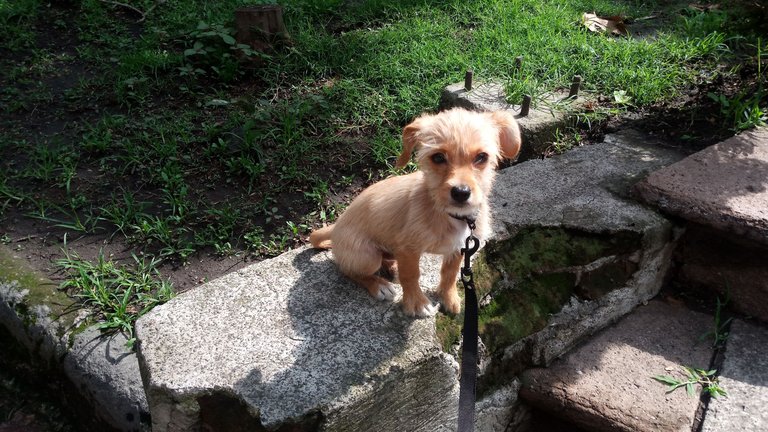Today I want to write about how I play with my little dog. This may seem like a pointless topic at first, after all, most of us know how to play with a dog. Throwing the ball or tugging on a rope may not be a big deal, but once you scratch the surface you'll realize that there's a lot more to it than one would first assume.
Games to Teach Important Lessons
We all have an idea of what a perfect dog should be like. One that politely waits for permission before dashing through a door or climbing up on the couch. They should not only accept their leash and harness, but preferably learn to love them. Also, they should not make a huge fuss when it comes to having a bath or getting their nails cut. Most little dogs don't come with these skills preprogrammed, so they need to be taught to internalize them. But how can a dog learn these desirable behaviors?
Gamified Learning
The answer is by playing! A clever owner will come up with activities to offer to the dog, which on the surface feels entertaining, but underneath it creates good habits to adopt. At first these are so basic that many of us would not even consider them "games". Getting a dog to sit is a great first step. The next one would be to lie down. Now alternate the two, and you get something of a doggie push-up, which I'm still amazed at how eagerly my four-legged student keeps repeating. After all, it feels nice to do something right!

Later on, there can be more skills added to this: following the lure of the hand to various places, taking up positions, etc. will ultimately lead to a fun obstacle course through the home, something that can always be expanded upon, making it gradually more challenging. While focusing on performing these tasks correctly, the dog won't even notice that they are getting good at following the orders of come, stop, wait, or whatever commands you want them to listen to.
No Free Food Policy
I think it goes without saying, that effective training needs to be based on rewards. This will typically come in form of food, especially for mouthy little critters like my Bandi. What's important to note, is that in order to be motivated by food, the dog needs to be a bit hungry. Not too much, where the hunger won't let him pay attention, but definitely not with a full stomach. Here I am reminded of the Latin proverb Plenus venter non studet libenter. (Ha! I never thought this piece of knowledge imparted to me in 8th grade would ever come in handy.)
To create ideal learning conditions I like to offer Bandi a bit of food in form of a puzzle to start out. Then we'll train play games, in which he is handsomely rewarded for desirable behavior. The key is low quantity at a high frequency. That way it'll feel like he gets tons of good food constantly, even though it comes from his regular breakfast portion. If there is anything left at the end of our learning session, he gets the typical dog-bowl experience, meaning that he can wolf it all down in a fraction of a second.
Bandido's Success Stories
The first thing that Bandi managed to learn quite effectively, was to truly enjoy his collar and leash. The simple practice of putting his head through the loop in order to access the food in my hand got him to associate the collar with it. After a few weeks of practicing this several times a day, he started putting his head through the collar when I offered it to him, even though there was no food involved. Since I don't want him to forget about this, I occasionally add some food, but I do it so randomly that Bandido must see me more like a slot machine than a vending machine. That's right: I'm getting my dog hooked on gambling!
Some other examples are getting him to love his crate, or leaving shoes, books, and house plants alone, which he used to love to chew on. Another important thing I believe he's learned pretty well too, is something I really don't want to utilize: the emergency callback button. For Bandi is a whistle, by now closely associated with a lick of liverwurst (delish!). Every time I whistle, he drops whatever he does (even his beloved chew-bone or his food puzzle) and comes running for this extraordinary treat. Sure, I may not have it with me when I need to call him back from... running into a dangerous situation, so for that reason I refrain from whistling when not practicing the callback.
What About Us?
Seeing the effectiveness of dog training using rewards, I started comparing it to us. Wouldn't humans be also more likely to adopt desirable behaviors if they received an instant reward? Take putting on your seat belt for example, something I believe should always be up to the individual, instead of being forced into. Instead of threatening fines or social disapproval, how about rewarding me with a simple dollar every time I buckle up? In fact, even a HIVE worth $0.20 would motivate me into such a simple action. And I'd do it gladly, ignoring all the philosophical backstory of victimless crime and freedom of choice regarding your personal safety.
Does this make me particularly easy to manipulate? Maybe... But honestly, I believe most of us are. In other words, our ruling overlords are doing a pretty poor job at controlling our behavior (if that's really what they want to do). Brave New World after all is a lot more effective than the brutal methods of 1984. But this is opening up a whole different discussion. Let's go back to dog training, where feeding, learning, and playing are combined into one set of fun and enjoyable activities.